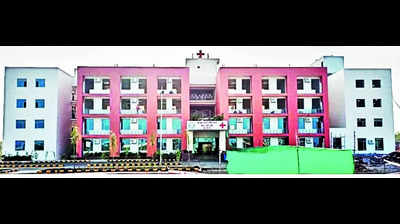- News
- City News
- rajkot News
- Guj’s first BSL-3 lab to come up at Rajkot AIIMS
Trending
Guj’s first BSL-3 lab to come up at Rajkot AIIMS

The lab, costing Rs 14 crore under the Pradhan Mantri Ayushman Bharat Health Infrastructure Mission (PM-ABHIM), will have the capability to diagnose highly infectious agents such as Japanese encephalitis, Chandipura, Crimean-Congo haemorrhagic fever (CCHF), hepatitis, and influenza.

Dr CDS Katoch, executive director of AIIMS Rajkot, stated, “The Biosafety level 3 (BSL-3) lab will significantly enhance the capacity to diagnose and research deadly viruses prevalent in Gujarat, such as CCHF and Chandipura Virus. It will enable rapid and accurate identification of high-risk pathogens, facilitating timely public health responses and advancing research in infectious diseases. This lab will be crucial in controlling outbreaks and mitigating the impact of these dangerous viruses within the state and beyond.”
As an interim arrangement, a Virus Research and Diagnostic Laboratory (VRDL) will soon become operational at AIIMS Rajkot. This BSL-2 level facility will provide advanced diagnostic capabilities for various viruses, including dengue, chikungunya, Japanese Encephalitis, measles, hepatitis, influenza, and Covid-19. The facility has already received permission from the National Institute of Virology (NIV) to commence testing for the Zika virus, offering critical support in the early detection and management of viral infections.
Since its opening in Feb 2023, AIIMS Rajkot has been running a 250-bed facility and handles over 600 outdoor patients per day as a multispecialty hospital.
We also published the following articles recently
2 die due to Chandipura virus in Gujarat's Aravalli; 1 hospitalized
Learn about the recent Chandipura virus outbreak in Gujarat's Aravalli district, resulting in two fatalities and one patient under treatment. Authorities have taken measures to control the virus, including deploying 50 teams for dusting operations. Find out more about preventive measures like using insecticides and dressing children in full-sleeved clothing.
Learn about the recent Chandipura virus outbreak in Gujarat's Aravalli district, resulting in two fatalities and one patient under treatment. Authorities have taken measures to control the virus, including deploying 50 teams for dusting operations. Find out more about preventive measures like using insecticides and dressing children in full-sleeved clothing.
Kids in this Indian state die of suspected Chandipura virus infection: Know what it is
Learn about the recent Chandipura virus outbreak in Himmatnagar, Gujarat, where four children have lost their lives. Discover symptoms, transmission, and prevention methods. Stay informed on this lesser-known virus.
Learn about the recent Chandipura virus outbreak in Himmatnagar, Gujarat, where four children have lost their lives. Discover symptoms, transmission, and prevention methods. Stay informed on this lesser-known virus.
Chandipura virus infection death toll reaches 15: Why does it have fatal outcomes in kids?
Learn about the Chandipura virus outbreak in Gujarat, its symptoms, prevention methods, and the importance of seeking medical attention early. Find out how to stay safe from this deadly virus spread by sandflies and why vaccination development is crucial for protecting vulnerable populations.
Learn about the Chandipura virus outbreak in Gujarat, its symptoms, prevention methods, and the importance of seeking medical attention early. Find out how to stay safe from this deadly virus spread by sandflies and why vaccination development is crucial for protecting vulnerable populations.
End of Article
FOLLOW US ON SOCIAL MEDIA










